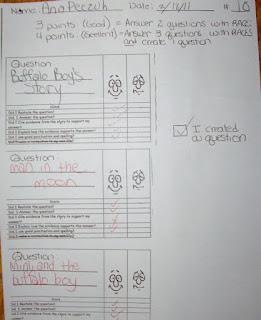WikiTalks
I have found that a wiki can help provide an authentic context for students to practice writing about what they've read in an online environment. Students need to focus on two things; first how to compose a well-written, supported response AND how to discuss online using elaboration and good punctuation and grammar (i.e. not texting language). I have created a wiki called WikiTalks where my students discuss short stories or novels that we are reading with another 4th grade class in our school.Getting Started: What Makes a Good Online Discussion Post?
I first introduced the concept of online discussions to my 4th grade students by using this What Makes a Good Discussion Response? lesson. They compared online vs. real-time discussions. They then tried out online discussing on the Nutmeg book award wiki as they responded to questions about our read-aloud, The Thing About Georgie. I was not very impressed with their posts. Students Learn How to Evaluate Quality Discussion Posts
I thought about how I could help my students become more self evaluative as they wrote their own posts. I decided that they needed to take a step out of the shoes of the writer and get into the shoes of an evaluator. So my students were informed that they have been chosen to be Official Discussion Post Judges for the Nutmeg book award wiki. This is a wiki that I have co-created for Connecticut's student book award program. Students, grades 4-8, from schools across Connecticut discuss the books. I told my that students that each month, they would determine the winner of the Wiki Post of the Month based on criteria. With that purpose in mind, students then read many examples of posts, sorting them into 3 piles, not so good, good, great! They used the great posts to create a list of criteria that they would use to judge future posts. This is what they came up with:
Criteria:
_It answers the question.
_It uses details from the book.
_It explains why. (I think....because....)
_It uses good spelling and punctuation.
_The person reading the answer understands something about the story.
They take this job seriously and each month we select a winner. As you can see, we are a bit behind! Snow days have taken a toll here in Connecticut.
Applying Criteria to Own Discussion Posts
Simultaneously, students were introduced to WikiTalks. Here they were going to discuss with the other 4th grade class in our school. I modeled posting a good response and then they tried it. The first time we used it, the students discussed a short story from Jr. Great Books. I treated the wiki like math manipulatives in that I did not focus so much on the content. I realized that they had a lot to think about procedurally, for example, they needed to learn how to log in, how to reply, how to post, how to navigate through the discussion, and of course how to get a customized icon! They also needed to get over the excitement of seeing their friend's immediate responses and get through a little social chat time.
After the initial introduction, students were then expected to focus on the quality of their posts and discussions as they discussed our new read-aloud, Where the Mountain Meets the Moon. At first, I did not see much quality in the posts. Even though we (the other 4th grade teacher and I) emphasized that students needed to write complete responses and use good grammar and punctuation, most students were not working to their potential. It wasn't until my brilliant co-worker came up with the self-assessment system that we started to see improvement.
I don't have the actual document, but here is a picture.
The students receive a score for the work they do on the wiki. For a score of 3, they must post two quality responses that meet ALL the listed criteria. The criteria we are using is school-wide scoring checklist for open-ended responses, called RACES. For a score of 4, the student must post three quality responses AND post a question. Anything less than two quality posts receive a score of 2 or 1.
But can students really self-assess accurately? I found that most could not. So even though this was a good exercise in evaluating own work, they still needed feedback to really understand the quality of their work.
The Kicker! Individual Conferences and Immediate Feedback
The quality of the responses went up once again when I actually printed out the responses that students went over and scored them myself. I stapled their responses onto their self-assessment sheets, I put my score next to theirs and wrote a couple of short feedback comments. Before the next WikiTalks, I quickly went over with the whole group what I was noticing and tips for how students could bring their scores up. Then, as students started to discuss, I went around and individually showed them their scores and gave them individual feedback. This made a HUGE difference. After the discussions, I printed out the posts again, stapling them to the self-assessments, and scored them myself. I saw improvement in all students' posts and most students scored either a 3 or a 4.
You can read the most recent posts here.
